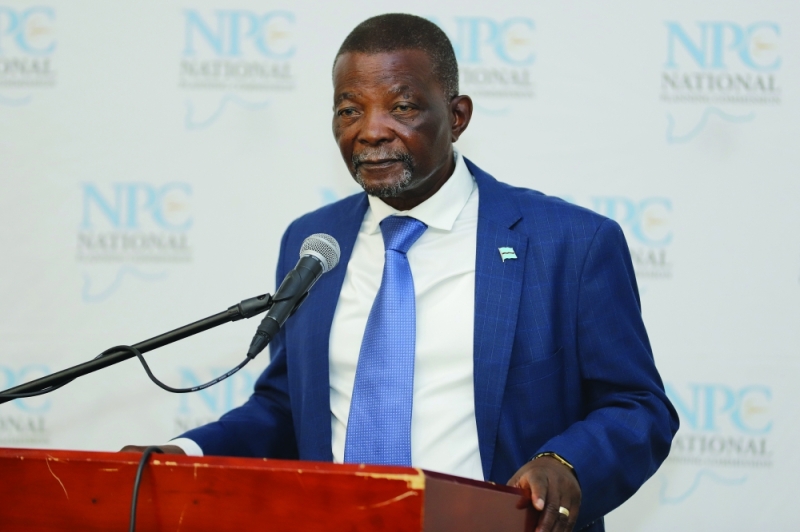Escaping the growth trap - NPC’s bold targets
Lewanika Timothy | Thursday August 29, 2024 15:17


Mmegi; Government’s re-rationalisation exercise of 2022 saw the separation of the Ministry of Finance and Economic Development birthing the National Planning Commission (NPC). What was the reasoning for this separation and what was the founding philosophy for the NPC.
Molomo: We were established as a transportation vehicle, driving the nation to Vision 2036. Government came upon the realisation that planning and financial management are two distinct mandates that cannot be served faithfully by one ministry. To plan you need to be ambitious, you need to dream and this requires looking beyond what is in the wallet.
It was evidently clear that it had been difficult for past planners to plan efficiently while also monitoring the country’s wallet. That is the founding vision for this Commission, to drive the nation’s ambitious plans and to ensure we reach the set national targets.
Mmegi: You speak of Vision 2036, but some technocrats have accused government of setting up targets that are vague and most of the time that can’t even be measured or reviewed. Before Vision 2036, the nation had Vision 2016 and to date the nation has been waiting for a review and account from government. What is the Commission’s response to these concerns?
Molomo: We are aware that there have been concerns about setting targets that cannot be measured or reviewed. That is why for Vision 2036 there is a composite index mechanism attached to it. There are set indicators against each goal, and they are well articulated in a way that the targets have performance indicators. This was done to allow for reviewing and debate.
Through this index you can also tell how far we are from achieving certain goals and visions. So the review doesn’t have to be done in 2036 but progressively we are able to assess our progress before 2036 and come up with measures and remedies when we find ourselves lagging behind what we have purposed to achieve.
Mmegi: One of the bold targets that government has set is that it wants to high income status for the country by 2036. Growth figures for the Gross domestic Product (GDP) in recent years show that the nation is falling behind the required growth targets. Botswana will have to significantly increase its wealth levels, a near doubling in Gross National Income per capita to reach the World Bank threshold. Does the Commission still believe this is a realisable dream in the set timelines?
Molomo: It is evidently clear that growth targets have been difficult to reach especially on GDP growth. But we are still relentless, we are not giving up. The National Transformation Strategy will see the propelling of other sectors to a faster rate of economic transformation. We are banking on diversifying the economy through bringing other sectors to the fore, to support mature industries like the diamond industry. We want to diversify the economy and one of the sectors we are looking at is agriculture. Agricultural growth has been very low and if it grows at quantum leaps it will add to the improvement in GDP growth targets. I do acknowledge that other sectors like mining have been struggling but even within the mining industry itself, we can still diversify into other critical minerals and allow the economy to continue to grow.
Mmegi: One of the main challenges of Botswana’s development is that while it has achieved reasonable macroeconomic success, there has been disparity over the sharing of fruits, as some economist put it. The national Gini-coefficient, which measures inequality, remains relatively high with income disparities persisting. What is the Commission’s plan to address such economic pain points?
Molomo: Disparity is multi-dimensional. The issue of the Gini-coefficient looks at income disparity levels and it’s mainly driven by unemployment. To address the inequality that exists in the country, we are looking at empowering emerging sectors so that they can be able to absorb more people into the labour force. But disparity stretches beyond just income, even in education there is disparity and it will be important to improve access and overcome discrepancies.
Mmegi: One of the other economic pain points that has hampered the successful use of development budgets to foster economic growth, has been the issue of implementation. In most cases, government has big ambitious budgets but rarely are they fully implemented leading to failure to achieve certain goals. How is the Commission planning on overcoming such challenges going forward?
Molomo: The use of implementation, monitoring and evaluation frameworks will serve to empower government departments and different agencies to be able to implement different budget needs. In the past our experience has been that due diligence is not fully carried out before projects are selected and advanced for financing. In some cases there is a plan to erect buildings without a proper study on the availability of land and other concerned resources. When projects are approved then challenges bud, greatly affecting implementation. The other silver bullet will be the use of digitisation which will help with faster implementation of processes.
